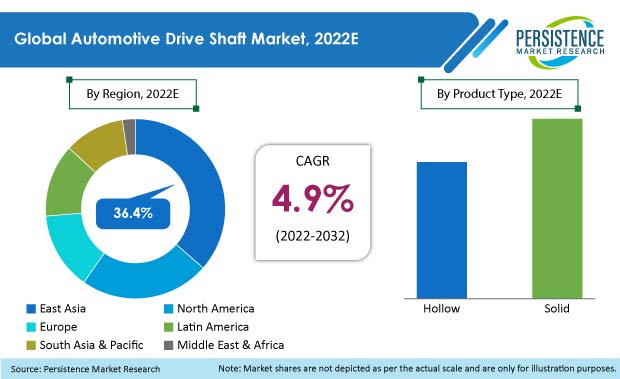Automotive Drive Shaft Market Segmented By Hollow, Solid Product Type in Front and Rear Position for Passenger Cars, Light Commercial Vehicles, Heavy Commercial Vehicles
Industry: Automotive & Transportation
Published Date: July-2022
Format: PPT*, PDF, EXCEL
Delivery Timelines: Contact Sales
Number of Pages: 235
Report ID: PMRREP31620
According to Persistence Market Research, the global automotive drive shaft market reached a size of over US$ 32 billion at the end of 2021. Worldwide Automotive drive shaft sales are expected to reach US$ 54 billion by 2032, increasing at a steady CAGR of 4.9% over the next ten years.
Over the coming years, increasing use of automotive drive shafts in conventional and hybrid vehicles is likely to drive market growth in East Asia to new heights. The East Asian automobile production scenario offers a promising future for automotive drive shaft suppliers. East Asia currently accounts for more than 36% share of the global automotive drive shaft market.
Revenue from the sales of automotive drive shafts currently accounts for 17% share of the global automotive driveline market.
| Attribute | Key Insights |
|---|---|
|
Automotive Drive Shaft Market Size (2021A) |
US$ 32.07 Bn |
|
Estimated Market Value (2022E) |
US$ 33.44 Bn |
|
Projected Market Value (2032F) |
US$ 54 Bn |
|
Value CAGR (2022-2032) |
4.9% |
|
Collective Value Share: Top 3 Countries (2021) |
56.2% |
From 2017 to 2021, the market for automotive drive shafts expanded at 1.5% CAGR and is anticipated to increase by 4.2% in 2022.
This significant increase in Y-o-Y growth in 2022 is because drive shaft manufacturers are upgrading their product lists to supply the best products to OEMs and increase their market share as the demand for electric vehicles increases, which, in turn, is driving vehicle manufacturers to focus all of their efforts on creating the most efficient electric vehicles.
A drive shaft, commonly referred to as a propeller shaft or prop shaft, is a mechanical part used to deliver torque and power to a vehicle's rear wheels or other powertrain components. Automotive drive shafts are more durable and hardly require any maintenance.
Other additional benefits of automotive drive shafts are their cheap operating costs, smoothness, lack of oil spill, reliability, and clean operation. Cars with a separate front-wheel drive, four-wheel drive, and front-engine rear-wheel drive have different drive shaft configurations.
Over the past few years, sales of electric vehicles have been seeing good growth, and it is anticipated that this trend will continue ahead as well. In addition, many manufacturers of electric vehicles intend to introduce more electric car types over the coming years.
Due to their concerns about the environment and the rising cost of fuel, key automotive corporations are refocusing on the electric vehicles market. As a result, it is anticipated that this will spur the expansion of the global market for automobile drive shafts in parallel.
Demand for automotive drive shafts in the global market is anticipated to grow 1.6X by the end of 2032.

Image above presents the share of product type and region in the automotive drive shafts market. Solid drive shafts hold a higher share in the global market. Usage of automotive drive shafts is the most in East Asia, closely followed by North America.
“Increasing Utility Vehicle Sales to Bode Well for Market Expansion”
A notable aspect that is predicted to have an impact on the overall growth of the automotive drive shaft market over the coming years is the sharp increase in utility vehicle sales around the globe.
The market for vehicle drive shafts will see new opportunities as a result of this, with breakthroughs in design and material science.
“Still Competition Expected from Composite Drive Shafts”
The introduction of composite drive shafts and the high cost of replacing a drive shaft are anticipated to limit market expansion. Rising worries regarding the product's heavy weight are predicted to present a challenge to automotive drive shaft manufacturers over the coming years.
Where Does the U.S. Stand in the Market for Automotive Drive Shafts?
The United States automotive drive shaft market is anticipated to expand at 3.1% CAGR during the forecast period of 2022-2032.
Increased demand for premium and luxury vehicles in the country and high vehicle manufacturing, vehicle sales, and production are having a direct impact on this market.
Significant market share maintained by the U.S. for automotive drive shafts is mostly due to the presence of major component manufacturers and car manufacturers in the country.
What is the Outlook for Automotive Drive Shaft Manufacturers in China?
China is expected to hold more than 71% share of the East Asia automotive drive shaft market by 2032.
Given the attraction of the domestic market and the low tariff of production, several OEMs have established their production facilities in China. Also, it is projected that the market for automobile drive shafts in the country will be driven by rising comfort demands and strict fuel efficiency regulations.
Why is Germany a Lucrative Market for Automotive Drive Shaft Producers?
Over the decade, the Germany automotive drive shaft market is projected to create an incremental opportunity of more than US$ 500 Mn.
Expansion of the German market for automotive drive shafts is correlated with rising car sales, simply because every vehicle needs a drive shaft. Consumer spending on vehicles increased as a result of rising personal disposable income and bettering socioeconomic conditions in the nation, which is driving the target market in parallel.
Why are Hollow Drive Shafts Gaining Immense Popularity?
Hollow drive shafts are estimated to create more than US$ 9.8 Bn in incremental opportunities by 2032, with the segment expanding at a CAGR of 5.4%.
Weight reduction in the automotive sector has been a huge headache for manufacturers and innovators. Due to the benefits that hollow drive shafts provide as compared to solid drive shafts, most passenger car makers employ hollow shafts as the drive shaft.
A hollow drive shaft with the same form as a solid drive shaft works exactly without malfunctioning.
Will Highest Usage of Automotive Drive Shafts Continue in Passenger Cars?
As per this analysis, passenger cars are estimated to hold around 47% of the market share by 2032.
Light and heavy commercial vehicles are expected to witness a collective drop of 270 BPS by 2032. Light commercial vehicles are said to represent the second-largest stake in the automotive drive shaft market for passenger automobiles.
Hollow drive shafts are widely utilized in passenger cars to provide comfort and fuel efficiency.
The worldwide automotive industry's expansion in 2020 was significantly hampered by the outbreak of the unique COVID-19 pandemic. The worldwide automobile drive shaft industry was also impacted as governments around the world were compelled to impose lockdowns and a variety of limitations on commerce and transit.
China is one of the most important countries in the automobile sector and is connected to 80 percent of the supply chain, either directly or indirectly. Sales of cars fell dramatically in the first quarter of 2020 as China's core industries, including the automobile industry, were forced to shut down.
Due to the shortage of raw materials and significant supply chain gaps brought on by COVID-19, manufacturing of motor vehicles was severely hampered across the world. Another factor was bottlenecks throughout the supply chain in the global automotive drive shaft market due to the lockdown in Hubei, which is home to more than 100 automotive suppliers and other automotive hubs.
However, now, the automotive industry is operating at full pace and the Chinese market is beginning to show indications of recovery. Still, the global market is anticipated to remain in a state of uncertainty at least through the third and fourth quarters of 2022.
Through their product offerings, drive shaft manufacturers aim to provide affordable alternatives without sacrificing vehicle performance. Suppliers are focusing on globalization and creating products that adhere to the current and prospective market emission norms.
Market players are closely collaborating with regional partners and OEMs to create new technologies to reduce development costs and provide effective solutions in the drive shaft market space.
| Attribute | Details |
|---|---|
|
Forecast Period |
2022-2032 |
|
Historical Data Available for |
2017-2021 |
|
Market Analysis |
|
|
Key Regions Covered |
|
|
Key Countries Covered |
|
|
Key Market Segments Covered |
|
|
Key Companies Profiled |
|
|
Report Coverage |
|
|
Customization & Pricing |
Available upon Request |
Automotive Drive Shaft Market by Product Type:
Automotive Drive Shaft Market by Position:
Automotive Drive Shaft Market by Vehicle Type:
Automotive Drive Shaft Market by Region:
To know more about delivery timeline for this report Contact Sales

The worldwide automotive drive shaft market is currently valued at over US$ 32 Bn.
Sales of automotive drive shafts are anticipated to increase at 4.9% CAGR from 2022 to 2032.
China, the United States, Germany, Brazil, and India are lucrative markets for automotive drive shaft suppliers. East Asia is anticipated to hold the largest market share of more than 36%.
GKN Automotive Limited, Nexteer Automotive, NTN, Hyundai WIA, and Wanxiang Qianchao accounted for 70% market share in 2021.
The market for automotive drive shafts in China is projected to expand at 5.8% CAGR through 2032.
The passenger cars segment leads the global automotive drive shaft market.
Increased import of aftermarket automotive parts from Asian countries in North America is a prominent trend in the market.
Together, Japan and S. Korea account for 11.4% share of the global market.